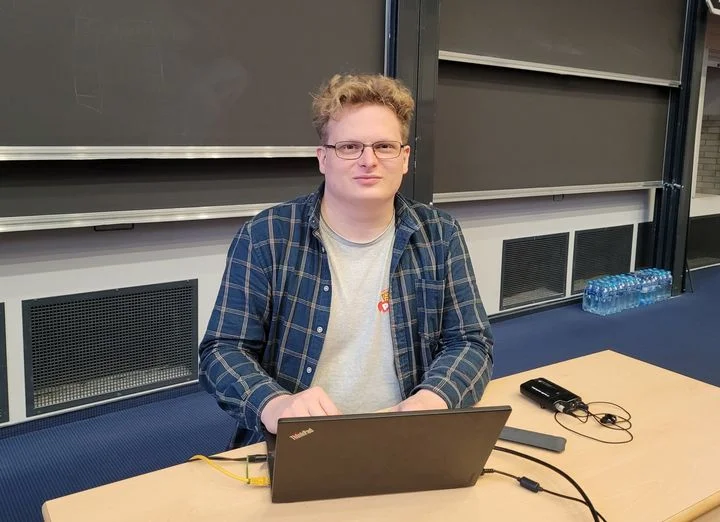
Next NCN grants for our researchers
Our researchers will pursue research activities owing to National Science Centre grants. They will not only work on complicated physics or computer science matters, but even French terminology associated with colorings and pigments.
A few days ago, the results of the MINIATURA 9 competition for proposals submitted in June were announced.
Received means can be spent for carrying out initial research, query, organizing a research trip, and for the supervisor’s support in preparation of the research project’s objectives planned to be submitted in the next, bigger grant NCN competitions, which is for the first time in the competition’s history.
MINIATURA grants have been awarded to 286 people so far. Now, the next 150 people joined the laureate list. Researchers will accomplish their research activities with an accumulated value of over 6 million PLN. Among them, five researchers from the University of Wrocław can be found.
In the current distribution, funding was given to:
dr Filip Chudy for the project titled ‘Badanie własności teoretycznych oraz rozwój szybkich algorytmów dla obiektów typu Béziera’;
dr Sylwia Romańska for the project titled ‘Partycypacja młodzieży w strukturach transgranicznych – pilotażowe badania porównawcze w Euroregionie Pro Europa Viadrina i Euroregionie Bałtyk’;
dr Gyozo Kovacs for the projects titled ‘Efekty skończonej objętości w pobliżu punktu krytycznego QCD dla ciężkich kwarków’;
dr Kaja Gostkowska for the project titled ‘Motywacja słowotwórcza francuskich terminów nazywających pigmenty i barwniki – zebranie korpusu terminów i ich definicji’;
dr Marlena Oleksiuk for the project titled ‘Nowa kobieta w Korei. Koreańska literatura kobieca w XX wieku’.

Dr Kaja Gostkowska form the Institue of Romance Studies (Department of Translation Studies) at the Faculty of Languages, Literatures and Cultures at University of Wrocław got MINIATURA grant for project titled ‘Motywacja słowotwórcza francuskich terminów nazywających pigmenty i barwniki – zebranie korpusu terminów i ich definicji’;
− Within the funding received in the NCN’s MINIATURA 9 competition, I am going to pursue a library query in Parisian libraries, to collect the body of terms and their definitions − says dr Kaja Gostkowska.
The subject of the research activity will be French terminology associated with colorings and pigments (e.g., terms such as bleu de Prusse – Prussian blue, jaune de chrome-chrome yellow, or vert de Veronèse-Veronese green).
− In the studies dedicated to materials applied in painting, I will look for linguistic and encyclopedic data, which will enable me to determine the French terms’ formative motivation. That is to explain which factors influenced ich form, what was the history of their creation, and such like − explains our researcher.
Panned activity comes under diachronic studies, a part of terminological studies, and also, in a broader view, fits into the mould of studies documenting the influence of material culture on language development.

DrGyőző Kovács from the Faculty of Physics and Astronomy (Department of Particle Physics and Nuclear Astrophysics) will study the influence of finite volume on various aspects of criticality observed in quantum chromodynamics (QCD) in the heavy quarks’ sector.
The importance of finite volume studies comes from differences between theoretical calculations and actual experimental systems in searching for the postulated critical point.
The heavy quark sector gives a possibility of studying those effects in effective models as well as in fundamental theory, which are not accessible in a physics scenario.
The use of various approaches helps researchers to understand systems’ analytical qualities, which are necessary for theoretical understanding. − Project’s difficulty consists in combining our knowledge from various perspectives to gain a comprehensive image of critical phenomena in QCD in finite volume − explains the researcher.

Dr Sylwia Romańska from European Studies Institute (Department of European Polytical Processes) at the Faculty of Social Sciences received grant for the project titled ‘Partycypacja młodzieży w strukturach transgranicznych – pilotażowe badania porównawcze w Euroregionie Pro Europa Viadrina i Euroregionie Bałtyk.’
In her research, she was working on Polish-German relations, borderline persistence for crises, and diverse European integration.
− The main goal of the piloting will be studying the relationship between the level of institutionalization of youth aged 16-25 participation and decisional agency in the area of cross-border politics − describes the researcher. Crucial will be studying local politicians’ experiences in young people’s participation in selected parishes and Euroregion structures, and defining their agency perception, from the politicians’ point of view, as well as youth and children councilors.
In piloting research, the triangulation of study methods will be applied: participant observation, comparative method, and in-depth interviews. Interviews will be conducted with representatives of local authorities and Euroregional structures, as well as with members of youth structures within the Council of European Municipalities and Regions. − The most crucial step is compiling a diagnosis of the condition of youth presence in cross-border politics. It is necessary to have regard to geographic borders, he border of the youth deciding impact and how to cross it with mutual trust, intergenerational dialogue, and a sense of agency − says dr Romańska.
Research will serve as a starting point for a bigger study project, which concerns mapping forms and patterns of youth’s impact on Euroregion areas with particular focus on cross-border regions in a comparative perspective.
The grant will be spent on pilot research and a week-long consulting trip. Research will be carried out in parishes of Poland, Germany, Lithuania, and Denmark belonging to both Euroregions.
Dr Filip Chudy from the Faculty of Mathematics and Computer Science at the University of Wrocław was granted for the research project titled „Badanie własności teoretycznych oraz rozwój szybkich algorytmów dla obiektów typu Béziera”. The project’s goal is to conduct a research visit with Prof. Kai Hormann at Università della Svizzera Italiana in Lugano in Switzerland. Prof. Hormann’s team, similarly to Filip Chudy and Paweł Woźny from the University of Wrocław, deals with algorithms for Bézier-type objects. Planned meetings are to enable the exchange of experiences, to establish cooperation, and to prepare scientific publications.
Among the potential researcher’s study topics can be found:
- improvement of the theoretical estimation of the error of fast algorithms for Bézier’s curve;
- calculation expeditement for baricentric representation for Bézier’s curve;
- fast evaluation of Bézier’s surface derivatives;
- generalization of baricenthric methods for Bézier’s surfaces;
Filip Chudy graduated Computer Science from our University. In 2023, he defended a PhD thesis and underwent an annual post-doctoral internship at the Maths Faculty in Bologna. After that, he came back to the Institute of Computer Science at the University of Wrocław, where he continues his scientific activity.

Dr Marlena Oleksiuk from the Institute of Classical, Mediterranean and Oriental Studies on the Faculty of Languages, Literatures and Cultures will spend the grant for the project titled „Nowa kobieta w Korei. Koreańska literatura kobieca w XX wieku”.
Since the Korean Han Kang was awarded with Nobel Prize in 2024, Korean literature in Poland has become very popular and is going through a real flowering. However, it wasn’t a regular thing for Korean women to write and be acknowledged by society as writers. − The fossilized system based on Confucian Philosophy reduced women’s role in society to be an obedient wife and caring mother, who should give birth to a son and take care of the house. There has to be a lot of reformations in Korean society to make Korean women be perceived as equal to men. My project will exactly cover those changes− says the researcher.
The main perspective taken in the study is the fact that women’s authorship publications have appeared among Korean XX century literature. Due to weak women’s publication possibilities during the Joseon Dynasty (1392-1910) and earlier, the impact of Western literature and modernization caused that at the beginning of XX century a new trend appeared – ‘new woman’ calling for equality in Korean Society also on the writing ground.
− Research concentrates on gathering the literature, which studies women’s writing in 20th-century Korea, and also on establishing scientific contacts, which will have its cause in writing a manuscript of the article considering ‘new woman’ in Korean literature − says the researcher − Study will focus on collecting information about ‘new woman’ in Korean literature and developing this strand in reference to the contemporary historical-political-literary situation on the Korean Peninsula.
The basic questions, which the project puts, are: What did the women’s situation in Korean society at the beginning of the 20th century look like? Why were there no publications of the women’s authorship earlier? How was the ‘new woman’ strand started? Which consequences did this strand bring to Korea? − enumerates the researcher. − In the study, the topic of women’s situation in Korean society, their access to education, and women’s laws in Korea will be taken up.
Dr Oleksiuk notices that the 20th century period was very turbulent for the Korean Peninsula. Starting with the Japanese occupation through Korea division into two countries, and then going through economic-political reforms in South Korea and implementing the regime in North Korea. − That is why the term ‘new woman’, which appeared during the Japanese occupation in Korea, is so crucial – explains. − That ‘new woman’ will venture to write and publicate, refer to important topics in their country’s history and culture, and also will start women’s writing, which will be able to develop thanks to it. ‘New women’ were interested in individual cultural and educational development and emancipation from strict patriarchal structures. Therefore, the strand not only brings novum to Korean literature, but also becomes a gender revolution. It is worth underlining that women writers, who contributed to the ‘new woman’ strand, have begun a series of cultural changes in patriarchal, fossilized, masculinized Korean society. It has begun the feminist movement and opened a path to women’s equality in South Korea.
In preparation to study the ‘new woman’ problematic in Korean literature, it will be necessary to conduct studies in key centres and Korean literature in Europe; library query at the Faculty of Oriental and African Studies in London; scientific consultations with Prof. Barbara Wall from the University of Copenhagen. Those actions will help in studying the women’s literature problems of the 20th century on the Korean Peninsula. − It is even more crucial that in Poland there is little literature on the topic of the ‘new woman’ strand in Korea − notices the researcher. − During that study, despite appearances, the biggest challenge will be collecting resources. That is why the query is needed. Korea researchers in Poland still have limited resources. I venture to say that we are suffering from a serious lack of scientific materials.’
In future studies, dr Marlena Oleksiuk would like to focus on women’s writing development in South Korea, too. − I would like to visit Ehwa Women’s University in Seoul in South Korea. It is one of the oldest universities in Korea, which was established in 1886 as an academic centre that educated many Korean women, at the same time becoming an institution open to women. The social image of Ehwa sustained the highest level in a competitive society in North Korea because it is a unique institution that accepted only women. Also, publishing house ‘Ehwa Womans University Press’ touches on the problematic of women and feminist studies in North Korea. Because the institution always supported women’s education and educated many Korean women, it is often perceived as a symbol of education and empowering women’s status in Korea. I think that staying at Ehwa Women’s University in Seoul would supply me with a lot of meaningful sources for further research.
Translated by Maja Filar (student of English Studies at the University of Wrocław) as part of the translation practice.
Information about grants on the NCN website.
Complied by Katarzyna Górowicz-Maćkiewicz
Date of publication: 5.11.2025
Added by: M.J.




